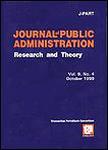-
作者:Jones, BD
作者单位:University of Washington; University of Washington Seattle
摘要:By 1958, a model of human behavior capable of serving as the microlevel foundation for organizational and policy studies was in place. The scientific soundness of that model is unquestioned, yet the fundamentals of that behavioral model of choice have not yet been incorporated into political science. Much analysis relies on models of rational maximization despite the availability of a more scientifically sound behavioral base. In this article I examine the reasons for and ramifications of this...
-
作者:Brown, TL; Potoski, M
作者单位:University System of Ohio; Ohio State University; Iowa State University
摘要:Governments not only choose which services to deliver to citizens, but they also choose how to deliver those services. Governments can produce services themselves or through a variety of external production mechanisms, including contracting with other governments, private firms, and nonprofits. In this article, we apply a transaction cost framework complemented with institutional and market theories to examine governments' service production decisions. Our analyses of a 1997 International City...
-
作者:Moynihan, DA; Ingraham, PW
作者单位:Texas A&M University System; Texas A&M University College Station; Syracuse University
摘要:in advancing improved accountability and performance, governments have relied upon one or more of the following approaches: political accountability or improved responsiveness to political direction, legal accountability or contract accountability, and performance-based accountability. This article examines the major approach to the last, managing for results (MFR), in the context of the American states. All state governments seek to improve decision making by employing MFR models but with cle...
-
作者:Raab, J; Milward, HB
作者单位:University of Konstanz; University of Arizona
摘要:Networks and networking are viewed as ways of dealing with complex problems that beset both the state and society. Homelessness, health care, and crime are all viewed as problems that networks can manage better than single organizations can. This article views these problems as networks that must be confronted if Western democracies wish to deal with terrorism, drug smuggling, and the manifold pathologies that confront failed states. In this article we adopt the perspective of networks as prob...

